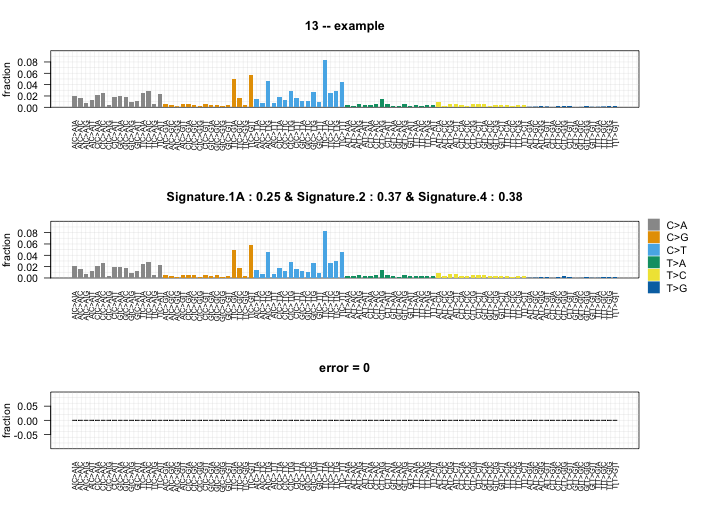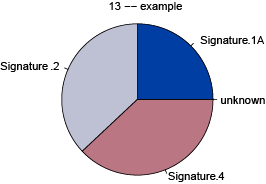Identifies Signatures Present in a Tumor Sample.
deconstructSigs
deconstructSigs aims to determine the contribution of known mutational processes to a tumor sample. By using deconstructSigs, one can:
Determine the weights of each mutational signature contributing to an individual tumor sample
Plot the reconstructed mutational profile (using the calculated weights) and compare to the original input sample
Once installed, deconstructSigs can be loaded:
library(deconstructSigs)
Using deconstructSigs
The most basic initial input to the deconstructSigs package consists of a data frame containing the mutational data for a tumor sample set.
This structure must contain the following columns:
sample identifier --
sample.idchromosome --
chrbase position --
posreference base --
refalternate base --
alt
mut.to.sigs.input()
Using the function mut.to.sigs.input, the mutational data for a set of tumors is converted to an n-row and 96-columns data frame where n is the number of samples present. Each column respresents how frequently a mutation is found within each trinucleotide context.
For instance, sample.mut.ref contains mutation data for two samples. Thus the output data frame will be 2x96 and contain the number of times a mutation is observed in each trinucleotide context for each sample ID.
head(sample.mut.ref)
# Convert to deconstructSigs input
sigs.input <- mut.to.sigs.input(mut.ref = sample.mut.ref,
sample.id = "Sample",
chr = "chr",
pos = "pos",
ref = "ref",
alt = "alt")
#> Creating a generic function for 'nchar' from package 'base' in package 'S4Vectors'
whichSignatures()
The output from mut.to.sigs.input can then be used as input to whichSignatures. Alternatively, a user can generate their own input data frame using calculated mutation information for each trinucleotide context per sample.
Two signatures matrices of k rows and 96 columns are also supplied as data in the package -- signatures.nature2013 and signatures.cosmic -- where k is the number of defined signatures. The signatures matrix consists of the fraction of times a mutation is seen in each of the 96-trinucleotide contexts for each signature k. As novel signatures are identified, a user may choose to supply their own signatures matrix of the same format.
The function whichSignatures takes these two inputs (tumor.ref, signatures.ref) and uses an iterative approach to determine weights to assign to each signature in order to best recontruct the mutational profile of the input tumor sample.
# Determine the signatures contributing an already normalized sample
test = whichSignatures(tumor.ref = randomly.generated.tumors,
signatures.ref = signatures.nature2013,
sample.id = 2)
A bit about normalization
If the input data frame only contains the counts of the mutations observed in each context, as is the case with the output from mut.to.sigs.input, then the data frame must be normalized. In these cases, the value of contexts.needed should be TRUE. An error will be raised if each row of the input data frame does not sum to 1.
An additional parameter to whichSignatures will dictate how any further normalization is done. This parameter, tri.counts.method, is originally set to 'default', which does not result in further normalization.
# Determine the signatures contributing to the two example samples
sample_1 = whichSignatures(tumor.ref = sigs.input,
signatures.ref = signatures.nature2013,
sample.id = 1,
contexts.needed = TRUE,
tri.counts.method = 'default')
sample_2 = whichSignatures(tumor.ref = sigs.input,
signatures.ref = signatures.nature2013,
sample.id = 2,
contexts.needed = TRUE,
tri.counts.method = 'default')
If tri.counts.method is set to 'exome', the input data frame is normalized by number of times each trinucleotide context is observed in the exome.
If tri.counts.method is set to 'genome', the input data frame is normalized by number of times each trinucleotide context is observed in the genome.
If tri.counts.method is set to 'exome2genome', normalization is performed to reflect the absolute frequency of each trinucleotide context as it would occur across the whole genome. Thus the count data for each trinucleotide context is multiplied by a ratio of that trinucleotide's occurence in the genome to the trinucleotide's occurence in the exome.
Finally, if tri.counts.method is set to a data frame present in the workspace, normalization is done by using that data frame as a scaling factor. The count data for each trinucleotide context is multiplied by the corresponding value given in the data frame.
Included with the package are tri.counts.exome, which contains the trinucleotide counts for an exome and tri.counts.genome, which contains the trinucleotide counts for the hg19 genome. These are the counts used for normalization when tri.counts.method is 'exome', 'genome' or 'exome2genome'. Any user provided data frames should match the format of tri.counts.exome and tri.counts.genome.
The method of normalization chosen should match how the input signatures were normalized. For exome data, the default method is appropriate for the signatures included in this package.
Optional parameters to whichSignatures()
Additional optional parameters to whichSignatures are:
associated-- Vector of associated signatures. If given, will narrow the signatures tested to only the ones listed.signatures.limit-- Number of signatures to limit the search to.signature.cutoff-- Discard any signature contributions with a weight less than this amount.
Output from whichSignatures()
The output of whichSignatures is a list of 5 elements:
weights -- data frame containing the weights assigned to each of the k signatures of the input signatures matrix
tumor -- matrix of the trinucleotide contexts for the tumor sample used as input
product -- matrix obtained when the tumor matrix is multiplied by the assigned weights
diff -- matrix representing the difference between the tumor matrix and product matrix
unknown -- numeric weight not assigned to any of the input signatures
plotSignatures()
The output from whichSignatures can be visualized using the function plotSignatures. This function takes the whichSignatures output (sigs.output) and an optional identifying parameter (sub).
# Plot example
plot_example <- whichSignatures(tumor.ref = randomly.generated.tumors,
signatures.ref = signatures.nature2013,
sample.id = 13)
# Plot output
plotSignatures(plot_example, sub = 'example')

makePie()
The output from whichSignatures can be visualized using the function makePie. This function takes the whichSignatures output (sigs.output) and an optional identifying parameter (sub).
# Plot output
makePie(plot_example, sub = 'example')
